- Home
- Todd Strasser
No Place Page 16
No Place Read online
Page 16
“They took him and a few others to the hospital.”
“Was he hurt?” It’s horrible to think they’d do that to someone so ill.
“I haven’t heard of anyone being hurt,” Mom says. “But I was so worried about you. We had no idea where you were.”
“There you are.” Dad joins us. “Where were you?”
My eyes meet his. I don’t know what to say to him. He looks at the ground and shakes his head. “Can you believe it?”
If only you knew. . . .
Do I tell him what I know?
Do I ask him why he did it?
Not now. The most important thing right now is to help figure out where people will stay tonight, and what will happen tomorrow.
I will ask him . . . when the time is right.
* * *
The police say it’s not safe to go into Dignityville tonight. Around the entrance there’s confusion. People are upset. They want to know what’s happened to their things. They need their medicine. I look for Meg, but don’t see her. I suspect she and her mom are at the hospital with Mr. Fine and Aubrey.
Gradually the crowd settles down on the curb to wait. It never occurred to me that there could be another step down from Dignityville. But there is—the street.
Hours pass while things get sorted out. Dad leads a group of us to Saint Stephen’s, the site of the near food fight the night we cooked chili. They’ve set up cots in the basement. Almost instantly there are long lines for the two bathrooms we’ll all have to use. We’re starting to settle in when Mayor George, collar askew and looking haggard, stops by to tell us that tomorrow we can go back to Dignityville to get our things. People pepper him with questions: Who did it? Why? Where will the homeless go now? Mayor George has no answers.
38
No one gets more than a few hours of rest. The next morning my fuzzy, sleep-deprived brain can’t seem to process nuance or transition. Two nights ago hunger kept me from getting a decent night’s sleep, but I managed to power through yesterday on adrenaline. Now, after a second sleepless night, the adrenaline’s dissipated and my thoughts have a fragmented quality. Life feels more like the separate slides of a PowerPoint presentation than a continuous live-action movie.
Outside it’s cold and rainy, a truly crappy day to spend cleaning up a decimated camp for homeless people. I want to get Dad alone and talk to him. I want to help at Dignityville, but Mom tells me to go to school.
In the hall my sleep-deprived brain feels like it’s lagging ten feet behind the rest of me. I look for Meg, but it’s not unusual for me to go a whole morning and not see her. As lunchtime approaches, in addition to dazed and wobbly, I start to feel apprehensive. Talia will be there. How do I face her, knowing what I know about her father? Knowing what I know about my father?
In the kitchen Lisa the lunch lady’s lips wrinkle sadly. “You okay, honey?”
No. I am so far from okay that I’m not even sure what the word means anymore.
But I shrug. “Guess so.” Then, because I don’t want to appear so gloomy, I force a smile. “We’re still here, right?”
Lisa smiles back. “That’s what counts.”
Does it?
I feel my pulse accelerate when I get my first look at the table. Noah and Tory are there, but Talia isn’t. Then I remember she said she and her mom were flying to the Northeast for a long weekend looking at colleges. That’s a relief. At least I won’t have to deal with the supreme awkwardness of facing her.
As I approach the table, the conversation softens to a whisper, then dies. Even though I know it’s because they don’t want to hurt my feelings, it still reminds me that I’m no longer part of their world. Today I can’t even pretend that Dignityville is my home. I’m the only one at the table who isn’t sure where he’s sleeping tonight, or when he’ll have his next meal. I know they’ll all continue to be generous and kind, but I can’t help thinking of Blanche DuBois and what she said about depending on the kindness of strangers. My friends have become strangers.
Noah stares at my shirt. With a jolt I realize why: I’m wearing the same clothes I wore yesterday . . . and slept in last night. The others must realize it too, because I feel them trying not to look. It’s unbelievable. I’ve gotten to the point where I make my own friends uncomfortable.
“Know what today is?” Noah finally asks, trying to sound cheerful.
I peer at him blankly. What can today possibly be?
He gives me a concerned look. “Two weeks until the Fall Classic . . . but listen, if you want to take a couple of days off?”
I can’t take more days off. Not if I want to be outstanding at the tournament. Not if I want to hold on to the only hope left for getting me and my family out of this mess. “I’ll be there this afternoon.”
Up goes a skeptical eyebrow. “You sure?”
“A man got to do what he got to do.” Rarely have those words felt as hollow as they do right now.
Noah nods uncertainly. “Okay, then. This is the final stretch. For the next two weeks we bump it up another notch.”
Two weeks . . . and I’m not even sure where I’ll be living then.
* * *
By the time school ends I’m having trouble walking a straight line. My body doesn’t want to practice; it wants to lie down in the hallway and go to sleep. But I can’t. I owe it to Noah to be there. I owe it to my parents.
It’s too cold and wet to go outside, so we use the indoor pitching mound in the gym.
A few miles away a bunch of homeless people have no choice but to be out in that cold and wet with no real idea of where they’re sleeping tonight.
Because Mr. Purcellen is worried about the value of his real estate.
The pitching mound is ten and a half inches high, made of AstroTurf, and slopes down in front. Standing on it, I rub a ball in my hands, feeling the seams and tiny irregularities in the scuffed surface that will make it fly through the air with its own unique path. And just as every baseball is slightly different, so is every human being. And like every pitch, every human will follow its own unique path.
To where?
Wearing his mask and chest protector, Noah squats down roughly sixty-two feet away. Above us the gym’s big duct fans whir and the halide lights hum.
“Ready,” he calls.
The ball feels rough in spots. Practice balls get scuffed. Life is about getting scuffed. The older we are, the more scuffed we get. Only some of us get scuffed more and sooner than others.
I’m so tired I swear I could close my eyes and go to sleep standing up.
“Ready?” Noah repeats.
Feeling light-headed, I put my foot on the rubber and look down at the ball in my hand. The red stitching, the cowhide. The game I’ve played my whole life. Above me the whirring fans grow louder and the lights seem brighter.
“Ready!”
With the ball nestled inside it, I lift my mitt in front of my face, and stare at Noah for the sign.
He starts to signal fastball.
Then he rises out of sight and gets replaced by something green.
It’s the AstroTurf, rushing toward me.
* * *
“Dan?” a voice calls from far away.
I open my eyes. Dark shapes hover against a bright background.
“Dan?”
I’m lying on my back. The shapes come into focus: Noah . . . Coach Buder . . . Zach . . . Tyler . . .
My face hurts. The floor under my back feels hard. Zach and Tyler are each holding one of my ankles so that my legs angle upward. “What happened?” I ask.
“You fainted.”
The pain in my face starts to localize to my right eye and one of my front teeth.
“How do you feel?” Buddha asks.
“Not sure.”
“Help him sit up.”
Hands prop me into a sitting position. My right eye throbs and it’s hard to see out of it. With the tip of my tongue, I feel a small gap where part of a tooth used to be. Buddha gives me
a concerned look, but Noah, still wearing his chest protector, seems to be fighting off a grin.
“What’s so funny?”
“You look like someone kicked the crap out of you.”
“Try to get up?” Buddha asks.
“Okay.” Fainting isn’t a big deal. Guys get woozy and keel over now and then, especially during long practices on hot days. It’s happened to me a few times before, but usually on a grassy field where it doesn’t hurt as much.
The guys get me up to my feet, where for a moment I feel light-headed, but this time I bend over with my hands on my thighs and get my head down around knee level. Hands steady me while the blood rushes back to my brain.
When I slowly straighten up, the dizziness is mostly gone. Buddha, who’s seen this happen dozens of times, studies me. “Think you’re all right?”
“Yeah.”
He turns to the others. “Get him into the locker room and we’ll put a cold pack on that eye.”
Noah and Zach keep their hands on my elbows as they escort me into the locker room. When we pass a mirror, I catch a glimpse of myself with a swollen, black-and-blue eye, and a puffy, split lip. I pull my lips back and there’s a triangular gap where one of my front teeth has broken on the diagonal.
Great, now I’m one step closer to becoming one of those old, toothless guys at Dignityville.
Buddha arrives with a cold pack and I press it gingerly against my eye. Noah tells me how I swayed for a moment, then fell face-first off the mound, the mitt with the ball exactly at eye level.
When they see that I’m okay, the others gradually drift away, but Noah stays until I’m ready to leave. “Where are we going?” he asks in the car.
“Not sure,” I answer, still holding the cold pack to my eye. “Try Saint Stephen’s.”
As we head into town, Noah says, “I hate to say this, man, but maybe you’ve got too much going on right now to be worried about that tournament?”
“Maybe,” I have to admit.
“I mean, think about it. There’s something like thirty thousand high schools in this country, and most teams have at least three or four pitchers. And that’s not counting the Dominican Republic, Puerto Rico, and Canada. So how many real eighteen-year-old prospects are out there? A thousand? And how many actually get drafted out of high school each year?”
We both know the answer. “About twenty.”
“The phenoms,” Noah says. He doesn’t have to add what we already know: I may be a good pitcher, maybe even really good, but a phenom? It’s doubtful.
“So what am I gonna do?” I ask, trying to resist the defeated sensation that threatens to close in.
“Finish school, go to college.”
“And my parents?”
Noah scratches his temple as he steers. “Honestly?”
“Yeah.”
“It’s not like they’re sick or can’t take care of themselves, Dan. Maybe, right now, they’re not your problem.”
39
Our new home is the Route 7 Motor Inn, a decrepit motel beside a busy highway. Mom and Dad have salvaged what they could from Dignityville and we were moved here by social services. We’re in one room with two sagging twin beds. The air stinks of antiseptic and the stale memory of cigarette smoke, and there are dark cigarette burns on the dresser and windowsill. Sunlight seeps in around the heavy curtains. From outside comes the steady rumble of trucks and cars on Route 7.
Despite the smells and noises, I sleep for something like fourteen hours. My parents weren’t there when I crawled into bed around seven p.m. last night, but this morning when I wake, Mom asks about the black eye and broken tooth. I tell her I got hit by a pitch in batting practice. Dad gives me a dubious look, but doesn’t pursue it. Mom says I’ll have to go to the dentist about the tooth.
Do dentists take food stamps?
There’s hardly enough space in this room for the three of us and our unpacked bags. It’s Saturday and this is my chance to talk to Dad about Aubrey’s beating and Mr. Purcellen, but my gut tells me not to say anything in front of Mom. Now and then his and my eyes meet and it’s obvious that he knows I want to talk. And also obvious that he’s not real thrilled about it. But there are other questions I can ask: “What happens to Dignityville?”
Dad slowly shakes his head. “It’s over. Everyone’s in shelters and welfare motels like this. Back where they were before there ever was a Dignityville.”
“What does Mayor George say?” I ask.
“That it was a worthy experiment,” Dad answers. “What he doesn’t say is that it’s a win for the local landowners. Thanks to them the homeless are invisible again.”
Mom pulls the curtain back to reveal the parking lot, and beyond it, the highway. Tears roll down her cheeks. Dad gets up and puts his arms around her. “Don’t worry, we won’t be here long.”
Her forehead wrinkles as she wipes the tears away with the back of her hand. “How can you say that?”
Dad shoots me a “don’t question this” look, then says, “Just believe me.”
40
I spend the rest of the weekend doing homework, watching TV, catching up on sleep, waiting for a chance to get Dad alone. Mom’s gotten a pay-as-you-go phone, and I speak to Noah and tell him I’m okay. I guess I’m lucky that Talia’s away looking at schools. On Sunday night we go to Uncle Ron’s for dinner again. He no longer acts angry, or disdainful of Dad. If anything, he seems puzzled, as if he can’t understand what’s happened to us.
On Monday morning a hand shakes my shoulder and my eyes open into Mom’s face. The motel room is dim, light filtering around the curtains. The din of traffic seeps in. “Hurry, sweetheart,” she whispers. “The bus is here.”
What bus?
“I’ll try to get them to wait.” She hustles out the motel room door.
It seems too early for a school bus, but I pull on whatever clothes are lying around, try to shake the cobwebs out of my brain, grab my books. Dad’s still asleep.
Outside the chill hits. It’s been a mild fall up till now, but this morning there’s frost on the windows of the cars parked outside the motel. My breath clouds and my broken tooth throbs when I inhale the brisk air. A school van idles at the curb and Mom stands beside the closed door, hugging herself in the cold. Young faces in the van windows peer out at me.
The door opens. As I pass Mom, she gives me a kiss on the cheek. A few years ago a kiss from Mom before boarding a school bus would have scored an eleven on the embarrassment scale of ten, but what difference does it make now? I’ve just come out of a run-down motel with a black eye and a broken tooth. Once again it’s hard to imagine sinking much lower.
Inside, the kids are all ages—elementary, middle, and high school. With only a few seats left, I take one next to a little kid. Gradually waking up, I glance around at my bus mates and notice little things: the frayed hems of their jeans, the worn heals of their sneakers, the holes in the elbows of their hoodies.
The van stops at another crappy motel a few blocks away, and four more kids climb on. There aren’t enough seats, and two of them have to stand in the back even though I thought that’s not allowed on school buses. But this is no ordinary early-morning, long-distance van picking up kids from the hinterlands. This . . . is the Homeless Kid Express.
* * *
When we get to school half an hour before the first bell, I realize it’s because it’s assumed that all of us qualify for free breakfasts. Inside the building an envelope is taped to my locker with a note from Ms. Reuben inviting me to stop by her office and chat if I feel like it.
If I do, I wonder what free stuff I can get this time. . . .
Whoa . . . I can’t believe I just thought that.
Welcome to How to Think Like a Homeless Person.
I hang up my jacket, dump some books, and with my stomach grumbling and nothing to do until school starts, give in to hunger and head toward the cafeteria to see what I can scrounge up. Yeah, I know I’m the one who said I’d never stoop to
a free breakfast.
Most of the kids from the Homeless Kid Express are down there, along with a bunch of others, including Meg. I never officially signed up for free breakfasts, but Lisa’s in the kitchen and without a word I get milk, a whole-wheat donut, and a bowl of Lucky Charms.
When I sit down opposite Meg, her eyes widen with concern. “What happened to you?”
I’m tempted to go with the old “If you think this is bad, you should see the other guy” joke, but she might think it had something to do with the demonstration. So instead I tell her the truth, then ask, “What about you? Where’re you staying?”
“Dad’s at the hospital because there’s no place for him to go right now. He has no idea that Aubrey’s there. They put Mom and me in a women’s shelter. What about you?”
I tell her about the welfare motel. “My father says we won’t be there for long. It’s just hard to imagine where else we can go. So . . . does Aubrey know what happened?”
Meg nods sadly. “He’s so disappointed. And you know what’s strange? In a way I almost miss Dignityville now.”
* * *
As lunchtime nears, I feel myself growing tight and anxious at the prospect of seeing Talia. In the cafeteria her expression compresses when she sees me. “What happened to your face?”
The table goes quiet. They’re all trying not to stare, probably thinking that this is the sort of thing that happens to the homeless. More evidence that life is rough out there in the world of the disadvantaged. But guys don’t like to admit that they fainted, so I need to come up with something. And it’s going to be a double whammy, because as soon as I answer, she’s going to see my chipped tooth. “I had an accident.”
“In a car?” she asks.
“On an indoor baseball mound.”
“Pushing himself too hard.” Noah comes to my aid, trying to make it sound heroic. And then, to take the focus off me, he asks Talia about the schools she visited over the weekend.
When Talia tells us about Sarah Lawrence, Skidmore, Smith, and Swarthmore, I can’t help wondering if she’s arranged her college visits alphabetically. She talks about how beautiful the campuses are and how she wishes she and her mom could have visited a few weeks ago when the fall colors were at their peak. It’s pretty obvious that she doesn’t want to talk about my new “situation,” at least not in front of her friends. And of course she can’t possibly have the slightest clue about her father’s involvement in the trashing of Dignityville.

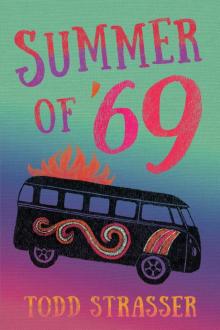 Summer of '69
Summer of '69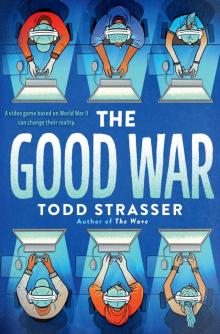 The Good War
The Good War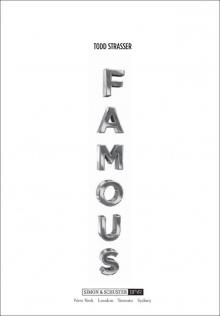 Famous
Famous If I Grow Up
If I Grow Up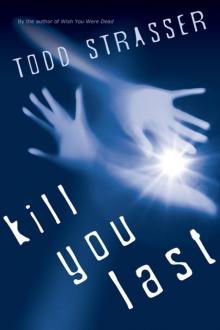 Kill You Last
Kill You Last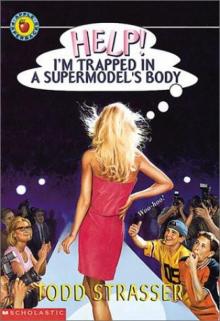 Help! I'm Trapped in a Supermodel's Body
Help! I'm Trapped in a Supermodel's Body Price of Duty
Price of Duty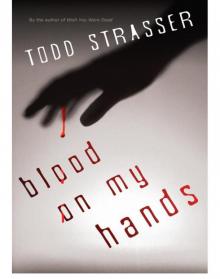 Blood on My Hands
Blood on My Hands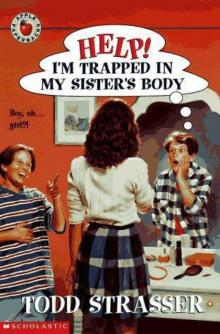 Help! I'm Trapped in My Sister's Body
Help! I'm Trapped in My Sister's Body sidewayz glory
sidewayz glory The Beast of Cretacea
The Beast of Cretacea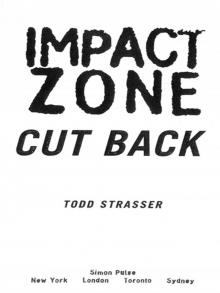 Cut Back
Cut Back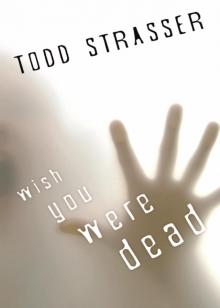 Wish You Were Dead
Wish You Were Dead The Wave
The Wave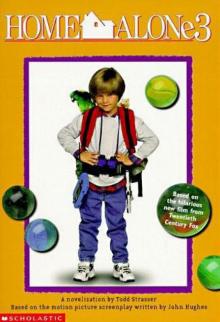 Home Alone 3
Home Alone 3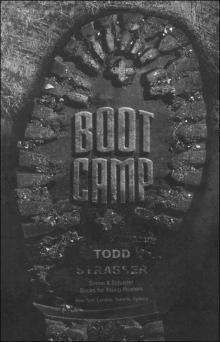 Boot Camp
Boot Camp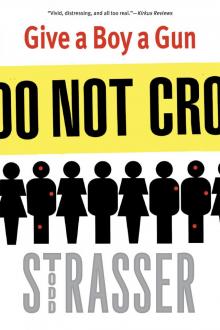 Give a Boy a Gun
Give a Boy a Gun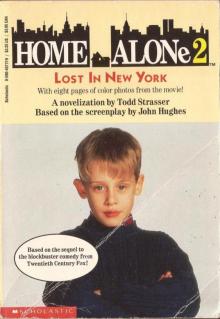 Home Alone 2
Home Alone 2 The Shore
The Shore Can't Get There from Here
Can't Get There from Here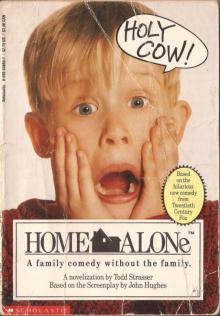 Home Alone
Home Alone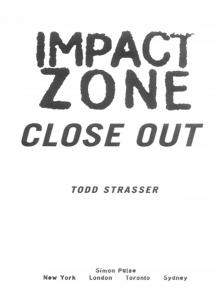 Close Out
Close Out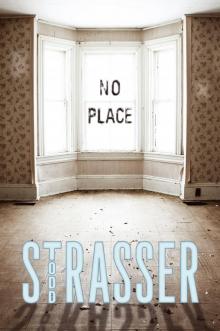 No Place
No Place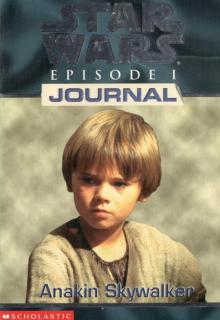 Star Wars - Episode I Journal - Anakin Skywalker
Star Wars - Episode I Journal - Anakin Skywalker